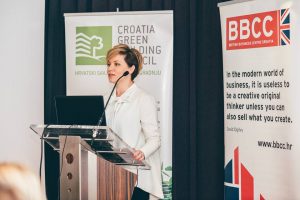The interest of the British business sector continuously grows, and it will probably continue at such pace with Brexit approaching.
The UK market is quite sophisticated and Croatian products need to meet these requirements in order to be present there. We are work together towards that goal – says Vedrana Likan, President of the Board of the British Business Centre Croatia for Diplomacy & Commerce magazine.

1. How many members are members of BBCC today and what do BBCC offer them?
BBCC was founded in 2014 at the initiative of the British Embassy, Department for International Trade and several companies in Croatia with the purpose to support British investors in Croatia and Croatian companies seeking to enter the British market. Today we have round 20 members, both Croatian and British companies with their offices and operations here. The number is growing and our members belong to various industries. In the broadest sense, our role is to help them to establish their operations either on Croatian or the British market, and to enable easier transfer and exchange of knowledge, experience, and expertise across the two markets.
2. What is the perception of Croatia in the eyes of British investors?
When we talk about investments, this does not necessary mean large projects – we are talking more about organizing festivals, starting smaller companies with 5-10 employees, offering consulting services, filming a TV series, or opening a franchise. And there are good examples of such British investments in Croatia. The experiences differ – some companies and individuals have successfully overcome administrative “traps” and have had good cooperation with the state and local governments, some failed. The administration and the unpredictability of the legal and taxation system are among the major problems, but the interest and positive attitude towards Croatia is the key to further British operations here.

3. What does BBCC offer to British and Croatian business people in concrete terms?
The strategy behind initial establishment of BBCC was to build an organisation that will organically grow its capacities and membership, in order to be able to support the members and actually add value to their business. So our services are adopted to suit individual needs of each of our members. When we help Croatian companies to strengthen their business connections with the UK, we support them by providing them with the relevant information, organize and facilitate meetings, and direct them to the relevant addresses and organizations. We organize tailor-made study tours to help the members to promote their business. We have successfully organized workshops on doing business in Croatia and the UK, and numerous networking events which always prove as a good place to establish good business contacts. In our next year plans, we scheduled several events in tourism sector under the umbrella name BritTravel, in order to connect our hotels, travel agencies and tourist boards, with key people in British market. However, our engagement naturally depends on what the members see as the key topic.
4.. How do you assess the current economic cooperation between Croatia and the UK?
The latest statistics say that the Great Britain occupies only the 9th place on the list of countries investing into Croatia and this happened only after BAT acquired TDR in 2015. The growth is seen mostly in tourism – the number of British tourist has continuous double-digit growth on yearly basis for several years already, and the new airline companies have started with their operations. Although we do export to the UK and import from the country – and there are some interesting cases that can be mentioned here, such as constructing a catamaran for the Thames that started during the Olympic Games in London – the overall economic cooperation between the UK and Croatia still has large potential for growth.
5. What will be the main activities that the BBCC Brexit Task Force will carry out ?
The BBCC Brexit Task Force has been derived from a larger initiative. This March, BBCC has joined Council of British Chambers of Commerce in Europe (COBCOE). COBCOE has started with the Brexit Ambition initiative, which main purpose is to define the challenges that the business sector across Europe sees in negotiation and post-Brexit period, and to present them both before the UK Government and the European Commission. As the part of the Initiative, we organized the roundtable discussion named “Let’s Talk Brexit”, and decided to establish the Brexit Task Force. The main idea of the Task Force is to discuss what is important for the Croatian companies in the context of Brexit, and how to tackle certain issues that will affect the Croatian businesses once the UK leaves the European Union. During our first meeting, some other issues popped up which were not directly linked to business, but rather some other segments of cooperation, such as education. Brexit has still not been much discussed in the Croatian public, and we see the BBCC Brexit Task Force as the coordinator of these discussions which will take on a form of recommendations to the Croatian Government on what to focus on during the bilateral discussions with the UK.
6. What is your cooperation with the British Embassy and UK Trade and Investment Team like?
The British Embassy and DIT support our work and initiatives, and this naturally gives us important role as the key driver of business relations between Croatia and the UK. We cooperate in different initiatives and they help us to connect with British experts in various segments of British business. We started a very fruitful cooperation with some of the speakers and guests at the events organized by the British Embassy, and this form of cooperation is very useful. In the future, BBCC will focus on creating more B2B opportunities, and I believe that we can continue to rely on the Embassy and DIT support.
7. What do you think needs to be done to further boost the overall economic cooperation?
We need to decide which industries we really want to promote more seriously, and then gather all the relevant institutions to invest their effort into making this happen. Personally, I see large potential in our food and wine industry, and with the right approach and good partners in the UK, I believe Croatian products can be more present both in the UK retail and exclusive places. However, much will depend on the post-Brexit rules, which gives us even stronger reason to be active in the Brexit-related discussions.